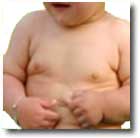|
New research suggests that early-life exposure to
antibiotics affects gut microbes and changes how
food is metabolized. The findings may explain how
antibiotics fatten farm animals. They may also have
implications for childhood obesity.

For more than 50 years, the agricultural industry
has used antibiotics to promote growth in livestock.
Low doses fed over time to cattle, swine, sheep,
chickens and turkeys can boost their weight by as
much as 15%.
Past studies have shown that, when administered at
high doses to fight infection or disease,
antibiotics change how the digestive system
metabolizes nutrients. The effects of treating
animals with these lower doses, called
subtherapeutic antibiotic therapy, haven't been
carefully examined.
Dr. Martin Blaser sounded the alarm to the
medical community and to the general public, that
the widespread use of antibiotics may be having
unintended consequences causing permanent changes in
the body's protective, friendly flora and causing
harm to the body's natural defense system. This may
be even more dangerous to health than the creation
of resistant "superbugs," which have garnered much
attention over the last few years.
A new study led by Dr. Martin Blaser at NYU School
of Medicine investigated the effects of low-dose
antibiotic therapy on the bacteria that live in the
intestines—the gut “microbiome”—of young mice.
The gut microbiome is a complex network of
microorganisms that play active roles in maintaining
our immune health, hormone production and growth.
Treatment with high doses of antibiotics alters the
population and structure of the microbiome. The
researchers expected long-term lower doses to have
similar effects.
To mimic the steady, low dose of antibiotics fed to
farm animals, scientists added antibiotics to the
mice's drinking water. They studied the total fat
mass, percent body fat and bone density of the mice.
The work, funded in part by NIH's National Institute
of Diabetes and Digestive and Kidney Diseases (NIDDK)
and National Center for Advancing Translational
Sciences (NCATS), appeared in the August 30, 2012,
issue of Nature.
After 7 weeks of exposure, the treated mice weighed
the same but had 10% to 15% more fat mass than
control mice. They also grew at a faster rate and
had increased bone density. Hormones related to
metabolism were higher in the treated mice. The
composition of their gut microbiomes was altered, as
was their metabolism of carbohydrates and fats.
In related work, Dr. Leonardo Trasande, Blaser and
colleagues analyzed data from over 11,000 children
in a British study, examining body mass and
antibiotic exposures during infancy. The results
appeared on August 21, 2012, in the online edition
of the International Journal of Obesity.
The researchers found that children who were given
antibiotics during the first 6 months of life were
more likely to have a higher body mass and were more
likely to be overweight by 3 years of age than those
who weren't given the drugs.
Exposure between 6 and 14 months wasn't associated
with body mass index at any time point. While
exposure to antibiotics between 15 and 23 months
appeared to affect body mass index at 7 years of
age, none of the exposures were linked to being
overweight or obese at 7.
Taken together, these results suggest that
antibiotics given early in life might affect the
risk for becoming overweight. More work will be
needed to confirm this connection.
For more information
Antibiotics in early life alter the murine colonic
microbiome and adiposity.
Nature. 2012 Aug 30;488(7413):621-6. PMID:22914093
Int J Obes (Lond). 2012 Aug 21. doi:
10.1038/ijo.2012.132. [Epub ahead of print].
PMID:22907693
Infant antibiotic exposures and early-life body mass
U.S.
Department of Health and Human Services -
National Institutes of Health (NIH)
(MDN)
|
![]()